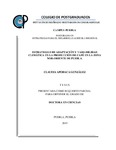Estrategias de adaptación y variabilidad climática en la producción de café en la zona nor-oriente de Puebla.
Abstract
El modelo económico que se aplica impacta en el sector agrícola y cafetalero al reducir su gasto público, además de enfrentarse a la variabilidad climática reflejada en el cambio de los patrones de las temperaturas y lluvias. Ambos factores influyen en la desatención de sus cafetales, repercutiendo en las condiciones económicas y alimentarias de pequeños productores. Ante esta situación, los cafeticultores se ven obligados a buscar estrategias de adaptación agrícola y alimentaria para aminorar sus efectos. La investigación se realizó en el municipio que se caracteriza por tener muy alta marginación, pobreza y con un alto porcentaje de hablantes de lengua indígena. El objetivo de la investigación fue analizar las estrategias de adaptación agrícola y alimentaria que han implementado los cafeticultores en su unidad de producción familiar ante la variabilidad climática y política agrícola en el municipio de Huehuetla, Puebla. Es un estudio retrospectivo y descriptivo, se tomó como puntos de referencia el año 2008 y 2018; se calculó el tamaño de muestra mediante un muestreo simple aleatorio y se aplicó un cuestionario a 108 productores. Se encontró que los productores perciben que el clima ha cambiado, han implementado estrategias de carácter agrícolas como la modificación de su calendario agrícola, reducción de labores agrícolas, uso de variedades resistentes a la roya (Costa Rica95, Oro Azteca y Marsellesa) y diversificación de cultivos. Sus rendimientos promedio (964.36 kg/ha) de café están por debajo del promedio estatal y nacional. Sus bajos ingresos han influido que su alimentación sea precaria; se compone básicamente de tortilla, frijol y chile; entre las estrategias implementadas como la migración y el empleo rural no agrícola, contribuyen a mejorar el consumo de productos de carácter animal ya que son de alto costo. Se concluyó que los efectos de la variabilidad climática y de la política agrícola han incidido en la prevalencia de bajos ingresos, los cuales no llegan a cubrir sus necesidades básicas de alimentación y nutrición. _______________ ADAPTATION AND CLIMATE VARIABILITY STRATEGIES IN COFFEE PRODUCTION IN THE NORTH-EAST AREA OF PUEBLA. ABSTRACT: The economic model that has an impact on the agricultural and coffee sector by reducing public spending, also faces the climatic variability reflected in the changing patterns of temperatures and rainfall. Both factors influence the neglect of their coffee plantations, affecting the economic and food conditions of small producers. Given this situation, coffee growers are forced to seek agricultural and food adaptation strategies to lessen their effects. The research was conducted in the municipality that is characterized by very high marginalization, poverty and a high percentage of speakers of indigenous language. The objective of the research was to analyze the agricultural and food adaptation strategies that coffee growers have implemented in their family production unit in the face of climate variability and agricultural policy in the municipality of Huehuetla, Puebla. It is a retrospective and descriptive study, the year 2008 and 2018 were taken as reference points; the sample size was calculated by a simple random sampling and a questionnaire was applied to 108 producers. It was found that the producers perceive that the climate has changed , so they have implemented agricultural strategies such as the modification of their agricultural calendar, reduction of agricultural work, use of varieties resistant to rust (Costa Rica95, Aztec Gold and Marseille) and diversification of crops. Their average yield (964.36 kg / ha) of coffee is below the state and national average. Their low income has influenced their diet to be precarious; it is basically made up of tortilla, beans and chili; among the strategies implemented such as migration and rural non-agricultural employment, they contribute to improving the consumption of animal products since they are expensive. It was concluded that the effects of climate variability and agricultural policy have influenced the prevalence of low incomes, which do not meet their basic food and nutrition needs.
Collections
- Tesis MC, MT, MP y DC [398]


